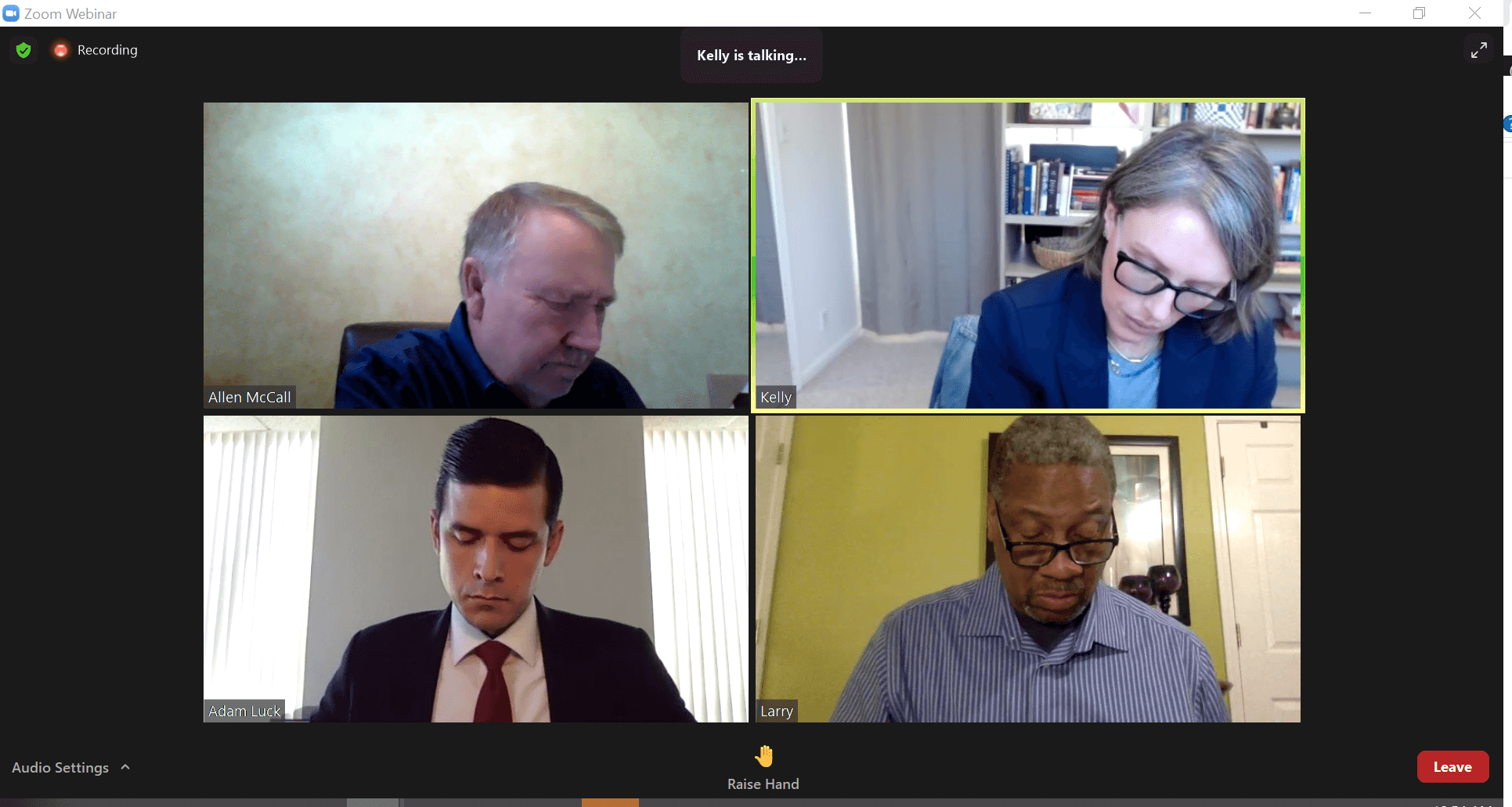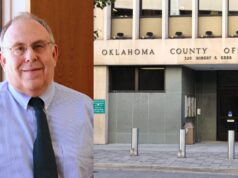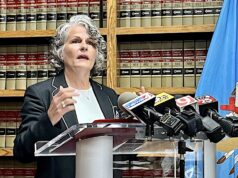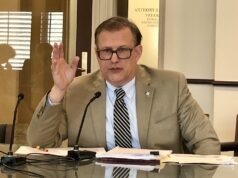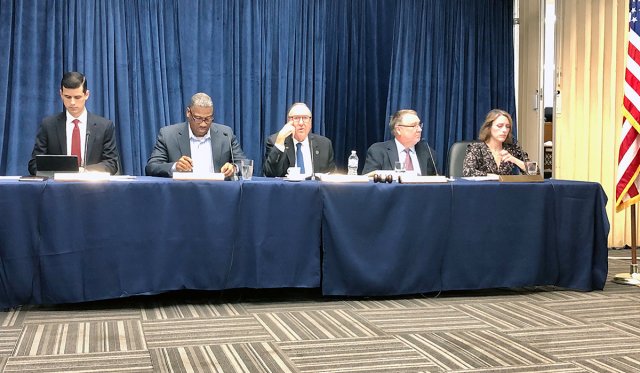

In a court filing that names Gov. Kevin Stitt as a defendant, Oklahoma County District Attorney David Prater is seeking an injunction to stop the state Pardon and Parole Board from considering commutation requests until it adheres to statutory and constitutional requirements Prater says the board has been violating.
In his 116-page filing (embedded below), Prater alleges “deliberate subversion” of the Title 57, Section 332.2 requirement to notify district attorneys of pending commutation requests, and he claims two Pardon and Parole Board members appointed by Stitt — City Care director Adam Luck and Center for Employment Opportunities employee Kelly Doyle — have had conflicts of interest regarding commutation requests. Prater says the board has failed to hold hearings to address the alleged conflicts.
“To protect the sanctity of the criminal process and to guarantee appropriate due process and fundamental fairness to the victims and those who advocate for them,” Prater wrote, “the district attorney now seeks injunctive relief barring defendant Pardon and Parole Board from considering any request for commutation until such time as statutory notice mandates are followed, barring defendant Pardon and Parole Board members from voting on any request for parole and/or commutation for which they have a conflict of interest or the appearance of bias and further barring defendant Stitt from granting any recommendation for parole and/or commutation that has been gained by these improprieties of the Pardon and Parole Board and its members.”
‘Blatant disregard for statutory mandates’
The filing points to the pending first-degree murder case of Lawrence Anderson as evidence of “the consequences of the board’s failure to adhere to legal mandates.” Anderson, who had previously served time for drug charges and domestic violence, was serving a 20-year sentence for parole violations related to drug use, smuggling drugs into a jail and possession of a firearm. Although he had been denied commutation in July 2019, Anderson was released after a January 2020 in-person hearing.
Shortly after his release, Anderson committed a grisly triple murder in which he killed a neighbor then removed her heart and cooked it. He attempted to feed the heart to his aunt and uncle before killing them as well. Anderson confessed to the crimes.
Prater’s filing does not specify how the board failed to adhere to legal mandates in the Anderson case, but it points to a news report in which Grady County District Attorney Jason Hicks expressed frustration with the commutation process, saying prosecutors were not receiving adequate opportunity for cases to be reviewed.
On March 3, The Oklahoman reported that Anderson may have been released by mistake, as records show his Stage 1 commutation request was denied in July 2019, which should have stopped it from moving forward any further. The Oklahoma State Bureau of Investigation is looking into how Anderson ended up on the January 2020 commutation list. One issue under examination could be an internal Pardon and Parole Board policy change from 2018 that was supposed to make incarcerated individuals wait three years after a denial before they could re-apply for commutation.
Prater’s filing says the Pardon and Parole Board routinely fails to provide copies of applications for commutation to the district attorney within 10 days of receiving them, as required by law, and does not give the district attorney adequate notice of the commutation cases that are coming up for review.
“Such blatant disregard for statutory mandates reflects not only a deliberate course of action by [the Pardon and Parole Board], but also impedes the district attorney from carrying out his duty to serve as a victim’s advocate and to see that justice is carried out,” Prater wrote.
Reached Thursday afternoon, Pardon and Parole Board member Kelly Doyle was asked if the board has been providing district attorneys with the timely notice required by law.
“To my knowledge, yes. However, as you’ve probably been aware, the influx of commutation applications in the last two years has been something unseen in the history of the Pardon and Parole Board, and I would say very much our staff capacity was challenged by this influx,” Doyle said. “I couldn’t speak to if there were some notifications that were missed because of this influx.”
‘I will not be recusing myself’
Prater singles out Doyle and fellow board member Adam Luck in the lawsuit, accusing them of having a financial interest in commuting sentences because both are employed by nonprofit organizations that work with people newly released from prison.
He also cites instances where Luck publicly commented on commutation cases before the board had reviewed them, including the controversial commutation case of convicted murderer Julius Jones, which has drawn national attention.
RELATED
Julius Jones commutation request moving to Phase 2 by Archiebald Browne
Earlier this month, Prater sent a letter to Luck asking him to recuse himself from Jones’ commutation application because he said Luck demonstrated “personal bias” on the case. After Jones’ submitted his application in 2019, Luck quote-tweeted a post from celebrity Kim Kardashian, who has been advocating for Jones’ commutation and included “Justice for Julius” references in her tweet.
Reached Thursday by phone, Luck declined to comment on Prater’s allegations. He did, however, address the alleged conflict of interest during Monday’s hearing on the Jones application.
“As constated based on our policy, it’s up to the board member to determine they have a conflict of interest,” Luck said. “I do not believe the communication in question constitutes a conflict of interest. So accordingly, I will not be recusing myself from the case in question on the March docket.”
Luck also spoke about his amplification of Kardashian’s tweet.
“By mentioning the communication in question, I [ensured] this explanation (of the process) would reach the largest audience possible in that context on that platform,” Luck said.
RELATED
‘It’s hard coming out of the penitentiary’: CEO offers new opportunities by Archiebald Browne
Similarly, Prater alleges that Doyle’s employment with the national nonprofit Center for Employment Opportunities poses a conflict, particularly as it related to November 2019’s historic mass commutation because Prater said CEO was involved in providing services to those leaving prison.
“I am in compliance with the board’s ethics policies and abiding by the Oklahoma ethics code,” Doyle said.
Both Luck and Doyle were appointed to the board by Stitt, and his administration criticized Prater’s filing in a statement late Thursday afternoon.
“We are not intimidated by political hit jobs disguised as ‘lawsuits’ in a desperate cry for publicity,” said Carly Atchison, Stitt’s director of strategic communications. “Gov. Stitt is proud of all four members of the constitutionally-established Pardon and Parole Board who take their jobs seriously and consider each case on its individual merits.”
The Pardon and Parole Board currently has only four of its five seats filled after the resignation and death of former Chairman Robert Gilliland. Stitt has yet to announce a replacement.
Prater filing against Pardon and Parole Board
 Loading...
Loading...
(Editor’s note: Andrea DenHoed and Archiebald Browne contributed to this story. The story was updated at 3:20 p.m. Thursday, March 11, to include additional comment by Doyle. It was updated again at 5:25 p.m. to include comment from Atchison.)









